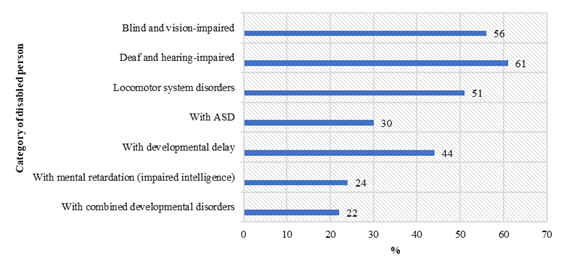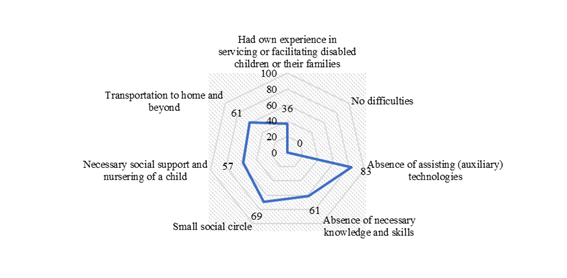Abstract
The article presents the author’s understanding of the modern phenomenon of “inclusive culture” and the possibility of considering this concept in terms of understanding the quality of professional education. The construction of teacher education on the basis of the axiological approach has actualized a whole line of problems related to determining ways of forming not individual knowledge, skills, but significant integrative value characteristics, which, of course, include an inclusive culture that provides the solution to the most elaborate complex pedagogical problems in implementing the ideas of inclusion the existing system of socio-cultural space. Some concepts related to the characterization of the teacher’s professional activity require modern refinement, understanding, and often updating the semantic and meaningful content. One of them is an inclusive culture, which is described very ambiguously and is often replaced by other terms. In order to identify possible mechanisms for the formation of an inclusive culture of future teachers in the context of university education, it becomes necessary to study this phenomenon, which requires a clear methodological justification and the use of carefully selected diagnostic tools. This article contains extensive empirical material that allows not only to draw conclusions by summarizing the experimental data, but also to build further the logic of an organized study aimed at finding modern effective methods of forming an inclusive culture.
Keywords: Future educatorsinclusive cultureprofessional training
Introduction
In the conditions of the dynamic development of education, the close attention of scientists and practitioners to axiological problems is clearly revealed in the aspect of the professional training of future teachers. Axiology, being a branch of philosophical knowledge, has methodological, theoretical and practical significance. Many modern scientists, noting in their studies a change in the axiological paradigm, thus actualize the problem of the formation of an inclusive culture of future teachers at the stage of their professional education (Volosnikova et al., 2017). It is clear that the lack of an inclusive culture can cause deformation of the nascent professional position of a young teacher, the collapse of the prospects for successful professional formation and development in an inclusive space (Ryapisova & Ryapisova, 2019; Chernenko, 2018).
Problem Statement
Formulation of the problem. Updating the content of the law “On Education in the Russian Federation”, introducing standards for children with disabilities, and introducing a model of educational inclusion have led to dramatic changes in the quality requirements for the training of future teachers working in inclusive education. A detailed review of the organizational and program-methodological support offered by higher education institutions allows us to state that the requirements and optimal forms of training future teachers for new conditions of professional activity are not clearly defined (Zhuravleva & Shumilova, 2020). The training of teachers for the implementation of an inclusive educational process often comes down to the formation of knowledge about impaired development (nosology) of children and the possibilities of taking them into account during the educational process. At the same time, unacceptably little attention is paid to the issues of the formation of an inclusive culture, and it is precisely it that ensures the readiness of the teacher to work with children with special educational needs. Practice shows that the tasks of creating a meaningful, responsible and sustainable professional position of a future teacher, whose activities will be carried out under conditions of inclusion, are not being sufficiently solved (Akhmetova, 2017).
Research Questions
The subject of our scientific search is an inclusive culture and its formation in the process of professional training of future teachers. Considering inclusive culture as an important component of the quality of professional training, we are convinced that this determinately promotes the teacher’s awareness of the educational process not as a routine activity aimed at a formal result, but as a process of continuous search, creativity, self-development, self-improvement.
Scientists note the close relationship of inclusive culture and inclusive education. According to a number of foreign researchers, the inclusive culture of the educational organization is formed into a special philosophy, manifested in the totality of values, traditions, knowledge, perceptions, responsibility, consent (Carrington, 1999; Dart, 2009); an atmosphere of trust and acceptance of atypicality in all its manifestations (King, 2006; Shelden et al., 2010); this is a cyclic process, representing a set of axiological systems of all, without exception, participants in the educational process (Cianca & Freytag, 2008).
From a humanistic point of view, it is important to form an inclusive culture of future teachers precisely in the process of studying at the university (Pershina, 2017). This will allow forming an inclusive educational environment of the university; willingness to professional activities of future teachers in the context of inclusion; eliminate the risk of discrimination and increase the status of persons with disabilities (Khitryuk, 2012).
Purpose of the Study
The purpose of the article is to describe the results of studying the formation of the inclusive culture of future teachers studying in the first year of a pedagogical university.
Research Methods
Description of the methods used. In the process of work, methods of theoretical and comparative analysis, systematization and generalization of materials about the subject of research, questionnaires were used.
The theoretical and methodological base of the study was composed of the socio-psychological concepts of the formation of an inclusive culture in society and a complex of systemic, axiological and competency-based approaches, which together complement each other. Moreover, the very possibility of integrated development is determined by the internal unity and methodological relations between them:
a systematic approach forms the research basis for the training of future teachers, provides a statement of the problem and a comprehensive study of any pedagogical phenomena, including such as the formation of an inclusive culture;
the axiological approach allows us to consider inclusive culture as a complex multidimensional process of developing value orientations through awareness of the internal value-semantic need and the needs of the most developing personality in self-education and self-knowledge, improving oneself, one’s inner world, one’s personal and professional qualities, which makes it possible to study the content, the structure and essence of inclusive culture;
a competency-based approach allows us to present an inclusive culture as a component of the quality of professional training of future teachers through a system of professionally significant personal qualities that deepen and specify the composition of professional competence of a future teacher.
Findings
The results obtained in this study. For the preparation and conduct of the survey, goals were formulated, a group of respondents was identified. Based on a review of scientific publications, a questionnaire was compiled to study the formation of an inclusive culture for future teachers studying in the first year of a pedagogical university. The reasons for a positive attitude towards an inclusive culture and the barriers to its formation are identified. The results of the study can be used to develop technologies for the formation of an inclusive culture of future teachers in the learning process at the university.
To investigate the subject of the study, a survey was conducted of 135 1st year students of the training direction 44.03.03 Special (defectological) education, undergraduates. The respondents were 128 girls (95 %) and 7 boys (5 %). The average age of the respondents was 22 years.


Conclusion
The results of studying the formation of the inclusive culture of future teachers allow us to conclude that the high degree of potential of the studied phenomenon, which manifests itself when interacting with people with disabilities, forms the social competencies of future teachers and affects the formation of their readiness for professional activity in an inclusive education. Understanding inclusive culture as the most important component of the quality of professional training of a future teacher, we defined it, on the one hand, as the willingness and ability to carry out inclusive activities in the context of the pedagogical process, and on the other, as an integrative characteristic of the level of professional training of a teacher based on fundamental psychological and pedagogical knowledge and skills developed, manifested in unity with personal qualities. In addition, inclusive culture is a necessary component of the general cultural and professional development of the personality, since it allows for the personal and professional development of the future teacher and optimizes the process of professional activity, ensuring minimization of the risks of inclusive education (Yarskaya & Yarskaya-Smirnova, 2015).
References
- Akhmetova, D. Z. (2017). Inclusive culture of society as a result of the implementation of inclusive policies and practices. Inclus. Ed.: the continuity of inclus. Cult. and pract., 3, 15–22.
- Carrington, S. (1999). Inclusion Needs a Different School Culture. Int. J. of Inclus. Ed., 3(3), 257–268.
- Chernenko, D. S. (2018). Study of the components of teachers' professional readiness for the implementation of inclusive education. 21st Century Youth: Education, Science, Innovation. Mater. of the VII All-Russ. Student Sci. and Pract. Conf. with Int. Participat. In 3 parts. Ed. by A. S. Khomchenko. Institute of Natural and Socio-Economic Sciences. (pp. 56–57).
- Cianca, M., & Freytag, C. (2008). Duets and Dialogues. http://www.inclusion-ny.org/files/Duets-andDialogue.pdf.
- Dart, D. (2009). Social Work with Disabled Child. New York, 273 р.
- Khitryuk, V. V. (2012). Inclusive readiness as a stage in the formation of an inclusive teacher’s culture: structural-level analysis. Bull. of the Bryansk State Univer. General pedag. Professional pedag. Psychol. Private methods 1, 356.
- King, С. (2006). Examining Middle School Inclusion Classrooms Through the Lens of Learner-Centered Principles. Theory Into Pract., 42, 151–158.
- Pershina, N. A. (2017). Formation of an inclusive culture in the context of the study of teacher readiness. Education of persons with disabilities: experience, problems, prospects. Mater. of the II All-Russ. (correspondence) sci.-pract. Conf. (343 p.). (Barnaul, 24–25 February). Barnaul: AltSPU.
- Ryapisova, N. A., & Ryapisova, A. G. (2019). Definition of professional competencies of a teacher-psychologist implementing support for inclusive education. Ed. Development, 3(5), 37–41.
- Shelden, D., Angell, M., Stoner, J., & Roseland, B. (2010). School Principals’ Influence on Trust: Perspectives of Mothers of Children with Disabilities. The J. of Ed. Res., 103, 159–170.
- Volosnikova, L. M., Efimova, G. Z., & Ogorodnova, O. V. (2017). The risks of educational inclusion: the experience of regional research at Tyumen State University. Psychol. Sci. and ed., 22(1), 98–105.
- Yarskaya, V. N., & Yarskaya-Smirnova, E. R. (2015). Inclusive culture of social services. Sociol. Res., 12, 133–140.
- Zhuravleva, E. Y., & Shumilova, E. A. (2020). The educational environment as a means of modeling inclusive practice. Science and innovation are modern concepts. Coll. of sci. art.s on the results of the Int. Sci. Forum. Editor-in-chief D.R. Khismatullin (pp. 48–55).
Copyright information

This work is licensed under a Creative Commons Attribution-NonCommercial-NoDerivatives 4.0 International License.
About this article
Publication Date
27 February 2021
Article Doi
eBook ISBN
978-1-80296-101-0
Publisher
European Publisher
Volume
102
Print ISBN (optional)
-
Edition Number
1st Edition
Pages
1-1235
Subjects
National interest, national identity, national security, public organizations, linguocultural identity, linguistic worldview
Cite this article as:
Shumilova, E. A., Kozyreva, O. A., Artyukhova, T. Y., Roslyakova, N. I., & Zhuravleva, E. Y. (2021). The Inclusive Culture Of The Teacher. In I. Savchenko (Ed.), National Interest, National Identity and National Security, vol 102. European Proceedings of Social and Behavioural Sciences (pp. 1195-1200). European Publisher. https://doi.org/10.15405/epsbs.2021.02.02.149

